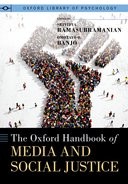 The Oxford Handbook of Media and Social Justice
The Oxford Handbook of Media and Social Justice
Contents
-
-
-
-
-
-
-
Genealogy of Political Economy of Media Genealogy of Political Economy of Media
-
Major Approaches to the Political Economy of Communication Major Approaches to the Political Economy of Communication
-
Political Economies of the Media in the Digital Platform Era Political Economies of the Media in the Digital Platform Era
-
Conclusion Conclusion
-
References References
-
-
-
-
-
-
-
-
-
-
-
-
-
-
-
-
-
-
-
2 Political Economy of Communication in the Digital Platform Era
Get accessDal Yong Jin is a Distinguished SFU Professor and a Global Professor at Korea University. His major research and teaching interests are on digital platforms and digital games, globalization and media, transnational cultural studies, and the political economy of media and culture. He has published numerous books, journal articles, and book chapters, including Korea’s Online Gaming Empire (MIT Press, 2010), New Korean Wave: Transnational Cultural Power in the Age of Social Media (University of Illinois Press, 2016), and Artificial Intelligence in Cultural Production: Critical Perspectives on Digital Platforms (Routledge, 2021). He is the founding book series editor of Routledge Research in Digital Media and Culture in Asia, and he has been directing the Transnational Culture and Digital Technology Lab since 2021.
-
Published:19 September 2024
Cite
Abstract
Political economy of communication has been a major theoretical framework during the past several decades. Although political economy is salient in a few domains, such as broadcasting, advertising, and information and communication technology, the contemporary political economy of communication closely relates to the advent and growth of digital platforms. Digital platforms, including social media platforms, over-the-top service platforms, and entertainment platforms—as the Western-based digital technologies—have expanded their dominance in recent years, resulting in power asymmetries between the global and the local. Because political economy analyzes the power relationships between politics and economics, it is essential to discuss the shifting power (im)balances between Western platforms and non-Western platforms, as well as the platform owners and users. By emphasizing a few primary areas concerning digital platforms, this chapter discusses the shifting media ecology in which digital platforms play a vital role in the early 21st century.
Sign in
Personal account
- Sign in with email/username & password
- Get email alerts
- Save searches
- Purchase content
- Activate your purchase/trial code
- Add your ORCID iD
Purchase
Our books are available by subscription or purchase to libraries and institutions.
Purchasing information| Month: | Total Views: |
|---|---|
| September 2024 | 13 |
| October 2024 | 22 |
| November 2024 | 5 |
| December 2024 | 4 |
| January 2025 | 7 |
| February 2025 | 14 |
| March 2025 | 8 |
| April 2025 | 5 |
Get help with access
Institutional access
Access to content on Oxford Academic is often provided through institutional subscriptions and purchases. If you are a member of an institution with an active account, you may be able to access content in one of the following ways:
IP based access
Typically, access is provided across an institutional network to a range of IP addresses. This authentication occurs automatically, and it is not possible to sign out of an IP authenticated account.
Sign in through your institution
Choose this option to get remote access when outside your institution. Shibboleth/Open Athens technology is used to provide single sign-on between your institution’s website and Oxford Academic.
If your institution is not listed or you cannot sign in to your institution’s website, please contact your librarian or administrator.
Sign in with a library card
Enter your library card number to sign in. If you cannot sign in, please contact your librarian.
Society Members
Society member access to a journal is achieved in one of the following ways:
Sign in through society site
Many societies offer single sign-on between the society website and Oxford Academic. If you see ‘Sign in through society site’ in the sign in pane within a journal:
If you do not have a society account or have forgotten your username or password, please contact your society.
Sign in using a personal account
Some societies use Oxford Academic personal accounts to provide access to their members. See below.
Personal account
A personal account can be used to get email alerts, save searches, purchase content, and activate subscriptions.
Some societies use Oxford Academic personal accounts to provide access to their members.
Viewing your signed in accounts
Click the account icon in the top right to:
Signed in but can't access content
Oxford Academic is home to a wide variety of products. The institutional subscription may not cover the content that you are trying to access. If you believe you should have access to that content, please contact your librarian.
Institutional account management
For librarians and administrators, your personal account also provides access to institutional account management. Here you will find options to view and activate subscriptions, manage institutional settings and access options, access usage statistics, and more.